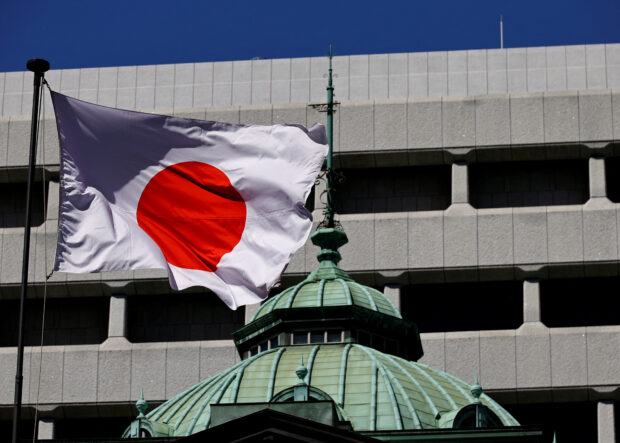Bank of Japan offers bleaker view on economy, flags upbeat wage signs

The Japanese national flag waves at the Bank of Japan building in Tokyo, Japan March 18, 2024. REUTERS/Kim Kyung-Hoon/File photo
TOKYO — The Bank of Japan cut its economic assessment for most regions on Thursday but signaled its confidence that wage hikes were broadening, leaving scope for another hike in the country’s still-low interest rates.
In a quarterly report on regional economies, the central bank said there was hope that smaller firms would hike wages by the same amount as last year or more, after bumper pay hikes were offered to employees by their bigger counterparts.
“With strong wage hikes sustained for two straight years, companies are changing their behavior to cope with rising labor costs,” such as boosting investment to streamline operations, the BOJ said.
“As wage hikes broaden, many regions saw a steady increase in the number of firms that were passing on labour costs or were considering doing so,” it said.
READ: Japanese firms offer biggest pay rise since 2013, union says
Article continues after this advertisementThe BOJ’s regional report will be among factors the board will scrutinize in producing fresh quarterly growth and inflation forecasts at its next rate review on April 25-26.
Article continues after this advertisementIntensifying labor shortage
The BOJ ended eight years of negative interest rates and other remnants of its unorthodox policy last month, making a historic shift away from its focus on reflating growth with decades of massive monetary stimulus.
While the decision was driven partly by hefty wage hikes offered by big firms, the pace of further interest rate increases will likely be swayed by whether pay rises will spread to smaller firms in regional areas of Japan, analysts say.
Japan’s intensifying labor shortage was keeping firms under pressure to hike wages, or prepare for an era where they need to keep raising pay to attract talent, said Takeshi Nakajima, the BOJ’s branch manager overseeing the Kansai western Japan region.
READ: More Japanese firms raising wages to combat labor shortage – Reuters poll
“When I ask companies what they see as future business challenges, they immediately talk about labor shortages,” he told a news conference.
Japanese firms have agreed to raise wages by 5.24 percent this year, a third survey by labour umbrella Rengo showed on Thursday, roughly unchanged from the second survey that showed the biggest rise under comparable data since 2013.
The third survey covers a larger number of firms, including smaller ones, than the first and second surveys.
In the regional report, the BOJ cut its assessment for seven of Japan’s nine regions.
Temporary dark clouds?
The downgrades were mostly due to the hit to consumption from unusually warm weather during the winter and slumping output due to auto production disruptions, the report said.
Japan’s factory output unexpectedly fell in February due to production and shipment disruption at Toyota Motor and its small-car unit, which could weigh on the broader economy due to their huge presence in the country’s manufacturing sector.
READ: Japan’s March factory activity shrinks at slower pace, PMI shows
“The region’s auto output clearly fell at the start of this year. But it’s likely to recover to fairly high levels soon,” said Tetsuya Hiroshima, the BOJ’s branch manager overseeing the Tokai central Japan region that is home to Toyota and many parts suppliers.
While the BOJ’s report said factors weighing on consumption and output were temporary, some branch managers warned of other risks such as the fallout from China’s economic slowdown.
“Exports aren’t doing so well mainly due to weak IT-related shipments to China, and the drag is lasting longer than many firms had expected,” said BOJ Osaka branch manager Nakajama.